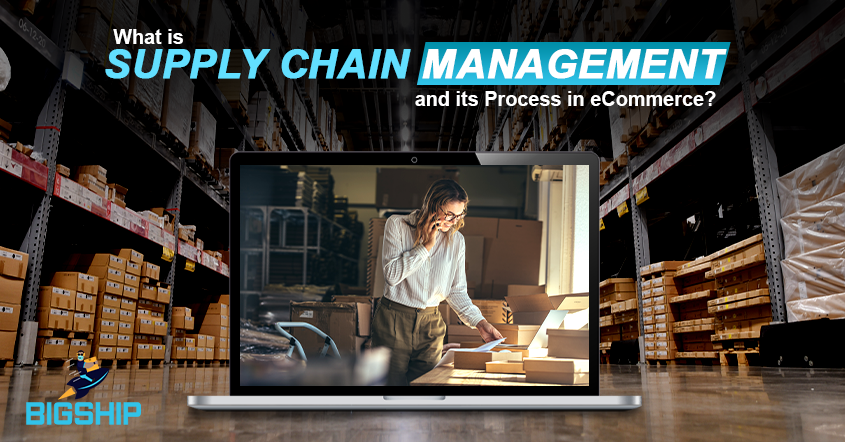What is Supply Chain Management & its Process in E-Commerce?

An integral part of e-commerce is the distribution channel control. In e-commerce, logistics and supply chain management focuses on the sourcing of raw materials, the production, and delivery at the proper moment of the right commodity. Which entails supply and demand control, warehousing, product monitoring, entry of orders, order management, procurement, and customer fulfillment. In case you have an eCommerce company then you need to understand that the quality of your products and the shipping go hand in hand. Your customer will lose interest in your valuable product if the delivery is not past and efficient. So if you are looking for the best courier company in India then BigShip is your answer.
Not only is the e-commerce sector restricted to building a website and offering merchandise online. It entails the design of the stock, adequate infrastructure, distribution, secured payment portal, and control of the logistics and supply chain. To meet the needs of consumers, a successful supply chain speeds up e-commerce operations.
Stock Control: A vital aspect of logistics and supply chain operations is inventory. Businesses have used their own stores to deliver goods directly to consumers according to the conventional inventory system. Yet e-commerce firms do not keep their own stock now, as per the threat approach, and outsource their inventory to a bigger wholesaler instead. It helps e-commerce firms to decrease the cost of running their own stock.
Several companies are implementing the drop-shipping approach for the material. Similar to this concept, a retailer does not keep the goods it sells on the internet, but it orders the item from a third-party and sends it to the consumer.
Reverse Shipments: E-commerce firms also have an SCM system that includes reverse shipping. The preparation and implementation of the transportation of products from the center of demand to the source of the source are known as reverse shipping. Almost all e-commerce firms have an interchange and return service. The requirement for logistics is intensified by this.
Accessibility and service standard of the product:
An e-commerce platform’s progress relies on consumer loyalty. If clients are unable to purchase the right merchandise at the right time, they can turn to other e-commerce outlets automatically. For e-commerce performance, a quality level of 95% of goods is optimal.
Processes can be well and structured, from stock to logistics and distribution to supply management. And if one distribution chain connection does not work properly, the whole operation of the distribution chain will collapse, resulting in a loss of sales.
Stock Waste Raises costs:
Because of their limitations on inventory control, e-commerce firms are expanding exponentially. With the market expansion, the commodity portfolio, distributor base, and contribution growth are also growing at a fast rate. Drastically rising inventory is a popular error made by e-commerce firms to satisfy consumer demands. The inventory constitutes a large proportion of e-commerce firms’ overall spending. Excess stock can evolve into expired (dead capital) stocks, which can contribute to higher costs.
We provide logistics solutions for supply chain operations that help e-commerce companies to control their stock in real and handle it. BigShip is emerging as the best courier company in India. E-commerce firms can conveniently handle orders and transactions with our SCM offerings. We have expertise allowing supply chain operations to be monitored and controlled. The implementation of order processing solutions and Stock Control systems are part of our logistics and supply chain business development capabilities.



